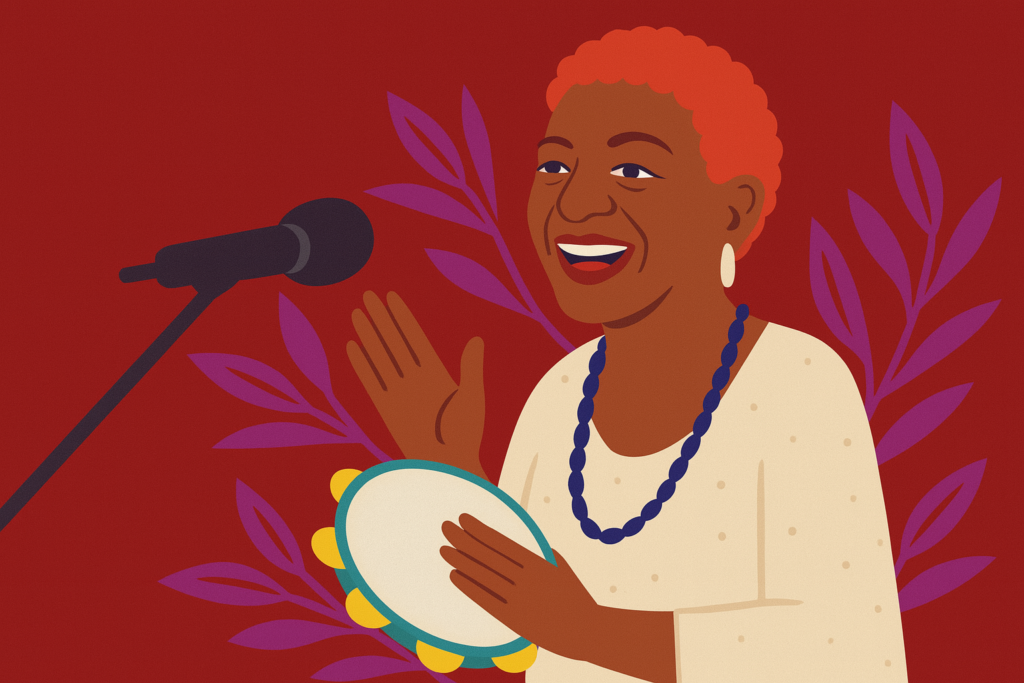
Djamila Ribeiro: Leci Brandão turns 80 as if stepping into a samba circle
Leci Brandão turns 80 and celebrates 50 years of her career as if she were stepping into her own samba circle: with confidence, joy, and a lot of celebration. The artist crosses generations, celebrates lives, and denounces injustices.
A woman born in Madureira and raised in Vila Isabel, she became the first woman to compose for Mangueira’s composers’ wing, a school where she is now an icon. With lyrics about love, Blackness, oppression, and orixás, her work has always carried social critique in its essence.
Seeing her turn 80, celebrated with a documentary about her life (“Leci,” directed by Anderson Lima), countless tributes, and the people’s love, is moving for all of us Black women.
As Cida Bento wrote in this same Folha, when the deputy received the Legislative Merit Medal from the state of São Paulo, “Leci Brandão remains an inspiring presence for all of us, Brazilian women and men — especially Black women — whether in art, culture, or politics in São Paulo and Brazil.”
There is another side of Leci Brandão that uplifts us: her public love for her mother, Dona Lecy de Assumpção Brandão. As the deputy, sambista, and composer said in an interview: “Dona Lecy was the person who most inspired me in this life. I have two sambas, ‘The Things My Mom Taught Me’ and ‘The Daughter of Dona Lecy,’ that portray what she means to me. She passed away in 2019, but I still miss her deeply.”
“My mother’s job was to sweep classrooms. She swept, and I, her only daughter, helped her. We swept in the morning, afternoon, and evening for the adult education classes. When it comes to sweeping classrooms, modesty aside, I know it well,” she continued in the interview.
Her love for her father, Antônio Francisco da Silva, I learned about from Fernanda Kalianny Martins de Souza’s master’s thesis on Leci’s life, later adapted into the book Filha de Dona Lecy, published by Gota.
A civil servant at Souza Aguiar Hospital, Antônio was a big musical influence. A fan of Jamelão, Jacob do Bandolim, and opera, he brought abundance home, where Dona Lecy prepared delights like fried cod with onion, bell pepper, and tomato sauce.
At school, Leci was a brilliant student and a regular newspaper reader, a habit she kept over the years. In fact, she reads this Folha. When she likes one of my columns, she writes to congratulate me.
I imagine she does the same with other Black columnists because it is in her nature to support and uplift those around her. Leci did not have children, but she is a godmother to many.
I grew up listening to her sambas, which cheered up the backyard parties at my parents’ house. They collected her vinyl records and knew all the lyrics by heart. Even today, when I hear some of her songs, they come mixed with barbecue smoke and the joy of happy days among working people; they turned the sweat of long days into smiling afternoons with grilled sardines.
With 50 years in her career, she has recorded dozens of albums, won the Brazilian Music Award several times, and led parade broadcasts, leaving her mark both singing and commenting on Carnival.
I think that after announcing so many times that a new leader, Zé do Caroço, was being born, Leci might not have realized that she herself became a leader in constant rise, eventually representing the people of São Paulo as a state deputy for almost two decades.
As she celebrates her 80th birthday, Leci remains active in public life, saying what needs to be said, as she did three weeks ago. On that occasion, she gave an extensive interview to this Folha. True to her life story, Leci was sharp and managed to recognize in pagode an advance where samba had not gone: songs expressing love for Black women.
Leci awaits us at Casa Natura Musical in São Paulo, on the 8th and 9th of next month, where she will celebrate her five decades on stage, alongside samba masters. May her light continue to illuminate the paths of so many generations.
This weekly column turns six years old today, a symbolic number for daughters of Oxóssi. My gratitude to the newspaper and to Sérgio Dávila for this space. I also thank all of you for accompanying me on this journey. Axé!
Originally published in Folha de S.Paulo
Related articles
Professor Djamila Ribeiro closes international tour with Cartas para minha avó in Lisbon
Djamila Ribeiro launches new website
Djamila Ribeiro is on the cover of Forbes Life